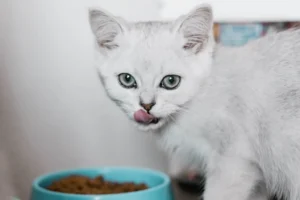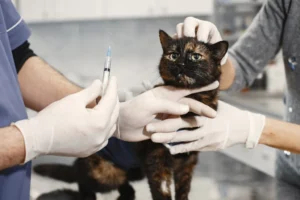Have you ever caught your cat scooting across the floor and wondered why they do it? It can be a confusing sight, but fear not, we’re here to shed some light on this peculiar behavior. In this blog post, we’ll delve into the reasons why your cat might be scooting and what you can do about it.
Your Cat’s Health: The Main Reason Behind Scooting
Look Into Your Cat’s Health History
Before diving into why your cat might be scooting, it’s essential to take a step back and look into your cat’s health history. Just like us humans, our furry friends can have underlying health issues that may be causing this behavior. Understanding any previous health problems or treatments your cat has had can provide valuable insight into what could be going on now.
If your cat has a history of anal gland problems or intestinal parasites, these could be potential reasons for their scooting. Regular vet check-ups and keeping track of any health concerns can help you connect the dots and get to the bottom of why your cat is scooting. By being proactive and informed about your cat’s health history, you’ll be better equipped to address any issues they may be facing.
Potential Health Issues That Lead to Scooting
When it comes to potential health issues that may lead to your cat scooting, there are a few common culprits to watch out for. Anal gland problems are a frequent cause of scooting in cats. These small sacs located on either side of the anus can become impacted or infected, leading to discomfort and the urge to scoot to relieve the pressure.
Additionally, intestinal parasites such as worms can also cause irritation and itching around the anus, prompting your cat to scoot in an attempt to alleviate the discomfort. If you suspect that your cat may have parasites, it’s crucial to consult with your veterinarian for proper diagnosis and treatment.
By staying informed about these potential health issues and keeping an eye on your cat’s behavior, you can quickly pinpoint the cause of their scooting and take the necessary steps to address it effectively. Don’t hesitate to reach out to your vet for guidance and support in keeping your feline friend happy and healthy.
When to Visit the Vet
If your cat is scooting frequently, it may be time to schedule a visit to the vet. While occasional scooting can be normal, frequent or excessive scooting could indicate an underlying issue. Your vet can conduct a thorough examination to determine the cause of the scooting behavior and provide necessary treatment. This could include addressing issues like impacted anal glands, parasites, or skin infections that may be causing your cat discomfort. Remember, it’s always better to be safe than sorry when it comes to your feline friend’s health.
Prevention and Management: How to Address Your Cat’s Scooting
When it comes to preventing or managing your cat’s scooting behavior, one key area to focus on is dietary changes. Adjusting your cat’s diet can help improve their overall gut health, which may in turn reduce the need for scooting. Consider feeding your cat high-quality, balanced food that supports their digestive system and promotes healthy bowel movements. Avoiding food that is high in fillers or allergens can also help alleviate any digestive issues that may be contributing to your cat’s scooting. Additionally, providing your cat with plenty of fresh water and ensuring they get enough fiber in their diet can help keep their digestive system running smoothly.
- Monitor your cat’s diet and be mindful of any changes in their bowel movements that may indicate digestive issues.
- Consult with your vet or a feline nutritionist to determine the best diet for your cat’s specific needs.
- Consider incorporating probiotics or supplements to support your cat’s digestive health and overall well-being.
For more information on feline nutrition and dietary recommendations, you can visit the American Association of Feline Practitioners website here.
Grooming and Hygiene
Your cat might scoot due to hygiene issues like impacted anal glands or feces stuck in its fur. Regular grooming, including brushing to prevent matting and keeping the area around the tail clean, can help prevent scooting. Additionally, make sure your cat’s litter box is clean to avoid any discomfort that might lead to scooting. Regular check-ups with your veterinarian can also help detect any underlying health issues causing scooting.
Interesting Facts About Cat Scooting:
– Cats might scoot to relieve itching or discomfort in their anal area.
– Scooting could also indicate the presence of worms or other parasites in your cat.
Environmental Enrichment
Cats might scoot due to stress or boredom, as they seek ways to alleviate their discomfort. Providing environmental enrichment, such as interactive toys, scratching posts, and stimulating play sessions, can help keep your cat mentally stimulated and physically active. Creating a safe and engaging environment for your cat can reduce stress levels and prevent the need for scooting.
Unique Insight: One way to provide environmental enrichment is by setting up a window perch for your cat to watch birds and outdoor activities, giving them mental stimulation and entertainment.
Remember, a happy and well-stimulated cat is less likely to scoot, so make sure to cater to your feline friend’s needs for a healthy and active lifestyle.
Historical Background
Cats and scooting have a long history intertwined in feline behavior. While it may seem peculiar to us, scooting is a natural instinct for cats to relieve discomfort or itchiness in their anal area. This behavior can be seen in cats of all ages, from kittens to senior cats, and is usually a sign of underlying issues that need attention.
Throughout history, cats have been revered for their mysterious and independent nature. In ancient Egypt, cats were worshipped as symbols of grace and poise. However, even these divine creatures were not immune to the occasional scooting session. The Egyptians may not have understood the reason behind it, but they likely recognized it as a normal part of feline behavior.
Fast forward to the modern age, and we now have a better understanding of why cats scoot. It can be caused by various issues such as anal gland problems, parasites, or even gastrointestinal discomfort. If your cat is scooting frequently, it’s essential to consult with your veterinarian to rule out any potential health concerns and provide the necessary treatment.
So, the next time you catch your cat scooting across the floor, remember that it’s not just a random act – there’s a reason behind it that needs your attention.
Understanding Your Cat’s Behavior
In addition to potential health issues, there are other reasons why your cat may be scooting. One common cause is the presence of feces or foreign objects stuck to the fur around their anal area. This can be uncomfortable for your cat and lead them to scoot in an attempt to alleviate the irritation.
Another less common reason for scooting behavior is a condition known as anal sac disease. This occurs when the anal glands become impacted or infected, causing discomfort for your furry friend. If left untreated, anal sac disease can lead to more serious complications, so it’s crucial to address this issue promptly.
When it comes to addressing your cat’s scooting behavior, it’s essential to observe their overall health and behavior. If the scooting persists or is accompanied by other concerning symptoms, make sure to schedule a visit to the vet for a thorough examination.
And remember, always provide your cat with a clean and hygienic environment to prevent any potential discomfort that may lead to scooting.
Additional Insight: Dietary Considerations
In addition to health issues, your cat’s diet can also play a role in their scooting behavior. Some cats may experience food allergies or sensitivities that can lead to gastrointestinal discomfort and, in turn, cause them to scoot. Make sure to provide your cat with a balanced and high-quality diet tailored to their specific dietary needs.
Introducing dietary supplements such as fiber or probiotics may also help support your cat’s digestive health and reduce the likelihood of scooting. Consult with your veterinarian to determine the best dietary plan for your cat and address any potential dietary triggers that may be contributing to their scooting behavior. Remember, a healthy diet is key to keeping your cat happy and comfortable.
Alex, a passionate animal lover, has experience in training and understanding animal behavior. As a proud pet parent to two dogs and three cats, he founded AnimalReport.net to share insights from animal experts and expand his knowledge of the animal kingdom.









